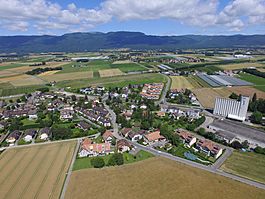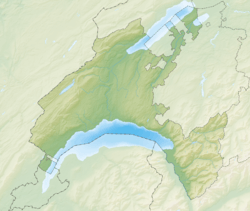Eysins facts for kids
Quick facts for kids
Eysins
|
||
|---|---|---|

Eysins, aerial view
|
||
|
||
| Country | Switzerland | |
| Canton | Vaud | |
| District | Nyon | |
| Area | ||
| • Total | 2.38 km2 (0.92 sq mi) | |
| Elevation | 438 m (1,437 ft) | |
| Population
(Dec 2020 )
|
||
| • Total | 1,738 | |
| • Density | 730.3/km2 (1,891/sq mi) | |
| Postal code |
1262
|
|
| Surrounded by | Arnex-sur-Nyon, Borex, Crans-près-Céligny, Nyon, Signy-Avenex | |
Eysins is a small town, also called a municipality, located in the Nyon district of Switzerland. It is part of the Vaud canton.
Contents
History of Eysins
Eysins has a long history! It was first mentioned in old records around the years 1001-1002. Back then, it was known by the name Osinco.
About Eysins
Where is Eysins?
Eysins covers an area of about 2.4 square kilometers (about 0.9 square miles). It is located along the road that connects Nyon and Divonne-les-Bains. The municipality includes the main village of Eysins and a smaller area called Le Petit Eysins.
The town used to be part of the old Nyon District. However, this district was changed on August 31, 2006. Since then, Eysins has been part of the newer, larger Nyon district.
How the Land is Used
A large part of Eysins' land, about 70%, is used for farming. This includes fields for growing crops, pastures for animals, and areas for orchards or vineyards.
About 8% of the land is covered by forests. The remaining 20% of the land is developed. This means it has buildings, roads, and other structures. Most of these developed areas are homes and other buildings.
Eysins' Coat of Arms
A coat of arms is a special design that represents a town or family. The coat of arms for Eysins has a blue background. On it, there is a golden cross. Above the cross, there are two golden roses.
People of Eysins
Population and Languages
Eysins has a population of about 1,200 people (as of 2022). Over the past ten years, the number of people living here has grown quite a bit. This growth is mostly because new people have moved to Eysins.
Most people in Eysins speak French, which is about 82% of the population. The second most common language is English, spoken by about 6% of the people. About 6% of the population also speaks German.
Age Groups
Eysins has a mix of different age groups. In 2009, about 16% of the population were children aged 0 to 9 years old. Teenagers, aged 10 to 19, made up about 12% of the population.
Adults aged 20 to 59 made up about 55% of the population. Older adults, aged 60 and above, made up about 17% of the population.
Population Over Time
The chart below shows how the population of Eysins has changed over many years:

Economy and Jobs
Working in Eysins
In 2010, the unemployment rate in Eysins was 6%. Many people in Eysins have jobs. In 2008, there were 235 full-time jobs available in the town.
These jobs were in different areas:
- Farming: About 13 jobs were in agriculture.
- Manufacturing and Building: About 104 jobs were in making things (manufacturing) or building things (construction).
- Services: About 118 jobs were in the service sector. This includes things like sales, transportation, hotels, restaurants, and education.
Commuting
Many people who live in Eysins travel to other towns for work. Also, some people from other towns come to Eysins to work. In 2000, more people left Eysins for work than came into Eysins for work.
Most people who work in Eysins or travel from Eysins use a private car to get to their jobs. About 12% of workers use public transportation.
Religion in Eysins
In 2000, about 40% of the people in Eysins belonged to the Swiss Reformed Church. About 30% were Roman Catholic.
There were also smaller numbers of people who belonged to other Christian churches, or to the Islamic and Jewish faiths. Some people did not belong to any church.
Education in Eysins
Schooling Levels
Many adults in Eysins have a good education. About 39% of the population have finished high school. About 22% have gone on to get a higher education from a university or a specialized college.
Local Schools
In the 2009-2010 school year, there were 134 students in the Eysins school district. The local school system provides two years of optional pre-school for young children.
Students attend primary school for four years. In Eysins, there were 81 students in the primary school program. After primary school, students go to lower secondary school for six years. There were 53 students in these schools.
Some students who live in Eysins go to schools in other towns. Also, some students from other towns come to Eysins for school.
Notable People
- Juste Olivier (1807–1876): He was a Swiss poet who grew up in Eysins. He studied at colleges in Nyon and Lausanne.
- Edgar Snow (1905–1972): He was an American journalist. He was famous for his books and articles about Communism in China. He passed away in Eysins.
See also
 In Spanish: Eysins para niños
In Spanish: Eysins para niños
 | Charles R. Drew |
 | Benjamin Banneker |
 | Jane C. Wright |
 | Roger Arliner Young |




